The Top 25 VPN Statistics, Facts & Trends for 2025
VPNs are staple remote office software in the COVID-19 era, but how many VPN users are there, and how much is the market worth? Are free VPNs really safe? Find the answers here and discover all the VPN statistics and facts you never knew you needed.
Key Takeaways:
- VPNs have been around since the 1990s when they were mostly used by businesses, but it wasn’t until the 2010s that commercial VPNs started gaining traction.
- Today, nearly a third of internet users use a VPN.
- The market for VPNs has been growing at an increased pace since the COVID-19 pandemic, and it’s expected to surpass $92 billion in 2027.
With COVID-19 forcing people into remote work, VPNs have become staple office software as a way to keep your connection secure while working online. With more content available online than ever before, VPN use in the home has increased dramatically, as well. That’s why we put together this list of the top 25 VPN statistics and facts to give you some insight into how and why people use these services.
We’ll go over a few quick VPN facts first, to give you a better picture of what VPNs are and how they’ve evolved over the years. Then we’ll take a deep dive into the full list of statistics, looking closely at each one and what we derived from the raw data. Then we’ll finish the whole thing off with an overview of trends in global VPN usage.
-
09/14/2021
Cloudwards.net updated this statistic article to add information about Kape Technologies acquiring ExpressVPN in September 2021 for nearly $1 billion.
-
11/30/2023
Updated the article to reflect ExpressVPN’s expansion of server presence from 94 to 105 countries.
VPN Statistics & Facts: The Basics
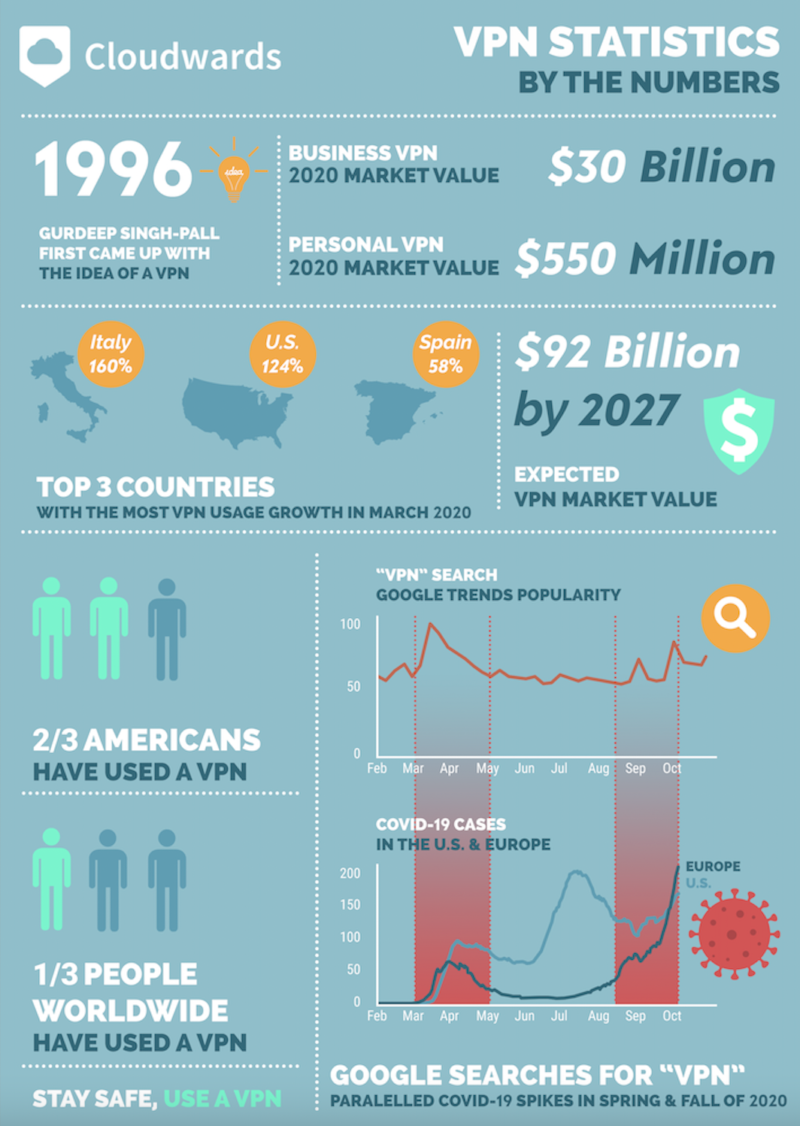
VPN stands for “virtual private network.” You probably know what a network is, so let’s look at the “virtual” and “private” parts of that name.
Private Network
If you’ve ever visited a public library or an internet cafe, you’ve probably used a private network. Private networks consist of several computers and the server that connects them all, and they let users on different devices access the same data.
Although the devices on a private network can be connected to the public internet, data in the private network can only be accessed by the devices connected to it.
Virtual
However, a physical connection to a company server is impossible in a remote office. This is where the “virtual” part comes in. Virtual private networks use the public internet to create a connection to the workplace that is sequestered from the general space of the internet (read our remote access VPN guide). The connection is encrypted and secured so that outsiders can’t access data within that virtual private network.
For a more comprehensive take on the topic, check out our full guide on what is a VPN.
How Commercial VPNs Work
Commercial VPN services use the same principle as a company’s virtual network. They use your internet connection to connect you to their own virtual private network. They then connect you to the internet again from their servers, so you’re technically using the VPN server’s internet connection to access the general web instead of your own.
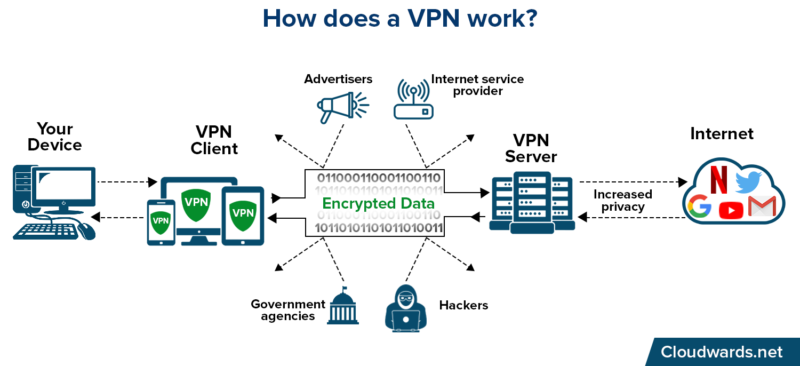
So, what does that mean for the general VPN user who just wants to watch Netflix in the U.S.? Well, if you’re located in, say, Guatemala, you can use a VPN service to connect to the internet from a server located in the U.S. To the general internet, it will appear that you are connected from the U.S., and Netflix will let you access its American library instead of the Guatemalan one.
However, using a VPN isn’t just about accessing location-restricted content. Because you’re never connected to the internet directly, no one knows where you’re actually located, as your IP address is effectively hidden from view. This gives you increased privacy and anonymity on the internet, and in turn, better data privacy and security.
Plus, some services offer better deals in other countries. We’ll use Netflix as an example again. In the U.S., a Netflix Premium account will cost you $17.99 per month. Compare that to Turkey, where you can get a Netflix account for $6.53 per month. That’s over $10 less than in the United States, which means changing your location to Turkey with a VPN can save you $10 per month.
A Brief History of VPN Services
VPNs have been around for quite a while now, but it wasn’t until relatively recently that their use really took off. In fact, VPNs were first dreamed up in 1996 by Gurdeep Singh-Pall — a Microsoft employee working on the point-to-point tunneling protocol (PPTP). However, it wasn’t until 1999 that the specifications were made public.
From then on, VPNs remained in the realm of large businesses, where they were only meant for internal use, connecting remote offices into a single virtual private network. This went on for roughly a decade, until consumer VPNs started to crop up.
We traced the histories of the most popular virtual private networks and we found that StrongVPN is among the oldest VPNs, having been founded in 2005. ExpressVPN is another very experienced service, launching in 2009. There were likely other consumer VPN services before that date, though online information is scant in this area.
Private Internet Access is similarly aged, with a founding date somewhere around August 2010, while NordVPN wasn’t released until 2012. New VPNs are still being created, such as Surfshark, which was released in 2018 but made our best VPN list in no time at all, despite being so new.
25 VPN Statistics: Data Security, Internet Freedom & the Growth of VPN Users
Now that our little history lesson is over, let’s take a look at the stats themselves and what they say about VPNs. We’ll start the list off with some general VPN statistics, then we’ll move on to more specific stuff, like business VPN facts, the impact of COVID-19 on VPN usage and the global VPN market. Without further ado, let’s hop right in.
General VPN Usage Statistics
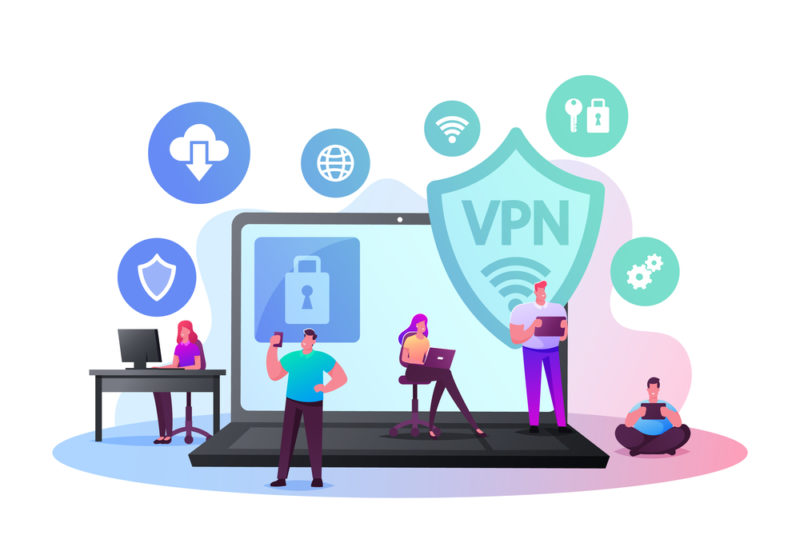
1. How Many VPN Users Are There?
The current number of active VPN users in the U.S. is around 38 million6. According to a report by Security.org1, around nine out of ten internet-going Americans have used a VPN at some point. That’s a total of 142 million VPN users in the U.S. alone. If you’re surprised by these numbers, we’ll take a look at the reasons why in the next statistic.
2. What Are the Main Reasons for VPN Use in the U.S.?
That same Security.org report1 mentions the main reasons for VPN use in the U.S. are general security and privacy, with security garnering 49 percent of responses and privacy getting a 40 percent response. Public WiFi usage was the third most popular reason, with 31 percent.
There was also a significant number of (less responsible) respondents who said they used VPNs to bypass work or school internet restrictions, presumably to watch cat videos instead of working. However, 29 percent of users say their use of VPNs is required by their company.
3. Why People Aren’t Using VPNs?
Of people who aren’t using a VPN, 57 percent say they simply don’t need a VPN for personal use1. Another 22 percent say they don’t need one for work and 22 percent claim that they are too expensive.
4. How Do People Around the World Use VPNs?
Better access to entertainment is the main motivator for VPN use worldwide, driving half of VPN users2. For example, when it comes to entertainment, Americans are spoiled for choice. The U.S. Netflix library has some of its most popular shows, while other regions get more restricted libraries, usually featuring local shows.
5. VPN Users Love Streaming Entertainment Content
Considering the previous statistic, it’s not surprising to find that VPN users are above-average streaming fans. In fact, VPN users are 40 percent more likely than average to access a streaming service subscription on a weekly basis, with 62 percent of VPN users accessing Netflix and other streaming platforms at least once a week2. You can read our streaming services statistics guide to learn more.
6. How Often Do People Use VPNs?
According to a 2020 Statista study polling U.S. and UK VPN users13, 41 percent reported using a VPN once per week, while an entire 36 percent of respondents said they use a VPN every day or nearly every day.
An older report by GlobalWebIndex2 using globally sourced data tells a different story, though. In that report, 35 percent of VPN users said they used one daily on their desktop computer (close to the Statista study), but only 10 percent said they use a VPN once per week. The difference could be chalked up to different usage by country, though it could also be caused by the rising use of VPNs.
7. VPN Popularity Among Different Age Groups
The largest VPN user age group in the U.S. is the 45 to 60 bracket, where an entire 75 percent use a VPN. The over-60 group uses VPNs the least, with only 57 percent using VPNs. The 18 to 29 and 30 to 44 age brackets have 71 percent and 67 percent using VPNs1, respectively.
8. Who’s Footing the Bill for VPNs?
According to Security.org1, businesses and organizations pay for 24 percent of all VPNs used. Free VPN users account for 29 percent of the total, though free VPNs are obviously not meant for business use (and we wouldn’t recommend most of them for personal use, either). Around 26 percent of users pay for their own VPN accounts, and a further 12 percent pay for a personal VPN but use a business VPN at work.
9. Which VPN Service Has the Most Servers?
Of VPN services that are trustworthy, Private Internet Access seems to have the largest server count by far, with an entire 32,696 (and counting) servers. That’s orders of magnitude above second-placed CyberGhost, with a server count of over 7,000. NordVPN also has an impressive number of servers, sitting at nearly 5,500 servers. (see statistics numbers 22 and 23).
10. Which VPN Service Has the Widest Coverage?
According to our research, the VPN service with the widest coverage is ExpressVPN, with over 3,000 servers in 105 countries. CyberGhost again comes a close second, with servers in 91 countries. Previous winner PIA places third here, with 78 countries covered.
VPN Use Amid the COVID-19 Pandemic

11. Google Searches for VPNs Increasing
Global searches for the terms “VPN” and “virtual private network” spiked twice since the pandemic began5. The first spike was mid-March 2020, when the virus started gaining traction in the U.S. The second spike happened around the time when the world experienced the “second wave,” beginning in September 2020.
12. Which Countries Saw the Greatest Increase in VPN Usage?
According to Statista4, Italy and the United States led the pack with the greatest increase in VPN usage in March of 2020, with Italy seeing 160 percent growth and the U.S. increasing VPN usage by 124 percent. This means the countries hardest hit by the coronavirus were also the countries with the biggest surge in VPN use.
Other countries were also quick to adopt VPNs, though the third highest position belongs to Spain, which saw usage increase by 58 percent.
13. How Has COVID-19 Impacted VPN Use Among Businesses?
According to OpenVPN3, the onset of the COVID-19 pandemic caused VPN use among businesses to increase, with 68 percent of companies either starting to use VPNs for the first time or increasing their use since it began. The study also reveals that 29 percent of companies are first-time users.
14. Some Organizations Still Reluctant to Adopt VPNs
The OpenVPN study also revealed an unfortunate statistic3. Despite high VPN adoption rates across the board, 21 percent of companies were revealed to have never used VPN software before COVID-19. Some of those companies did turn around when they switched to remote work, but an entire 71 percent remained skeptical, despite moving their work online.
15. Will the Trend for Business VPN Usage Continue?
According to the same OpenVPN study3, an entire 99 percent of respondents said that even after the pandemic is over and things are back to relative normalcy, they expect their companies to keep using VPNs.
Global VPN Market Statistics
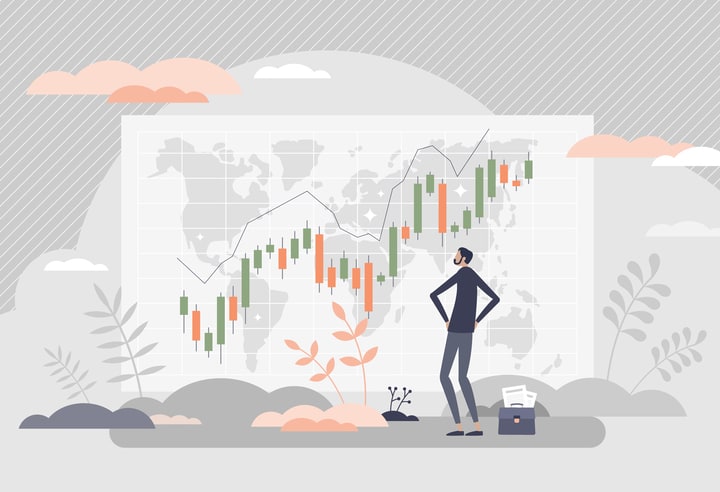
16. How Much Is the Virtual Private Network Market Worth?
The VPN market is estimated to have been worth around $30 billion in 20207. This value is mostly due to business VPNs, as the consumer VPN market size is much smaller, at roughly $550 million8.
17. The Biggest Acquisitions on the VPN Market
If you’re concerned about how big companies gobble up smaller ones, take a look at Aura and Kape Technologies. The two cybersecurity companies have been on quite the shopping spree in recent years. Larger companies buy out other companies all the time, so that’s nothing suspicious, but Kape’s case is a little on the murky side.
As of 2020, Aura is the proud owner of VPN Hotspot Shield and password manager 1Password14. It also happens to own smaller VPNs like TouchVPN and Betternet through prior acquisitions.
Kape Technologies, on the other hand, started life as a malware distributor called Crossrider. Then, circa 2017 it did an about-face and went into the VPN business, acquiring CyberGhost for $10.5 million.
It went on to buy VPN ZenMate in 2018, and in 2019 it splurged $95.5 million to buy Private Internet Access (read our ZenMate review). Then in September 2021, Kape Technologies bought ExpressVPN for a whopping $936 million, setting a new record for VPN acquisitions.
Kape Technologies also bought Webselenese (owner of vpnMentor) in 2021 for $149.1 Million.
18. Is the VPN Market Growing?
Unless something happens to curb current trends, the market will continue to grow. By 2027, it will be worth a whopping $92.6 billion7. The market for consumer VPNs is expected to nearly double in size soon, reaching $834 million by 20248.
19. North America Is the Largest Region for VPN Usage
Looking at VPN usage by region, North America takes the top spot. Thanks to the immense number of companies and organizations in the United States, North America took 35 percent of the worldwide VPN market7.
20. Which Countries Have the Highest VPN Adoption Rate?
When we look at the number of VPN downloads relative to the population, the Middle East stands out above the rest with the highest adoption rates. Smaller countries like the UAE, Qatar and Oman are leaders in the region, with VPN adoption rates of 61 percent, 53 percent and 35 percent, respectively. Saudi Arabia has the highest number of VPN users (check out our best VPN for Saudi Arabia) in the region with 10 million people using a service, which is around 29 percent of its population6.
21. Asia-Pacific Region Sees Highest VPN Use Growth
Until recently, Indonesia was the country with the most VPN users (with just under 42 million users), ceding the top spot to India, which currently has over 45.2 million VPN users6. Unfortunately, it’s hard to gauge the number of VPN users in China because its secretive government has banned VPNs, but indications are that it’s one of the fastest expanding VPN markets7.
When it comes to market expansion, the Asia-Pacific, Middle East and Eastern European regions are the places to watch. As restrictive regimes — including China, Russia, Turkey, India, North Korea and many more countries — crack down on free speech and continue censoring the internet, VPNs are emerging as a gateway to the free web for billions of people in Asia.
VPN Breach Statistics
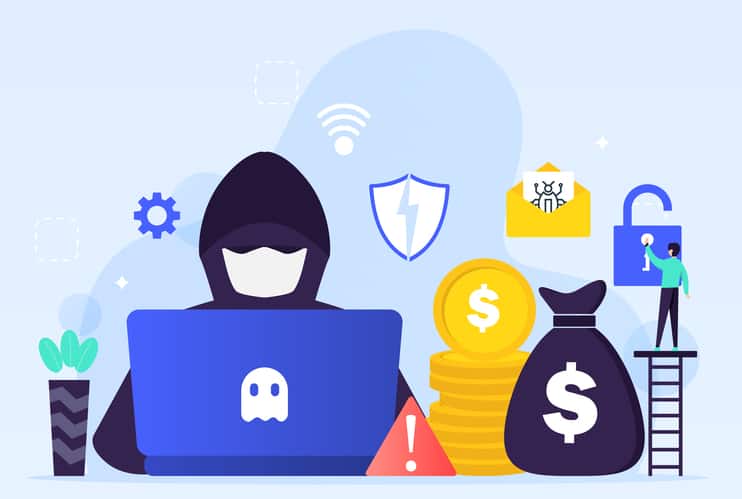
22. The IPVanish Data Privacy Scandal
IPVanish used to be a trustworthy VPN with a no-logs policy. Then in 2016, it was subpoenaed in a child pornography case, and after authorities took a more forceful approach, they were able to get the offender’s user logs. Now, the outcome might have been good in this case, but we’re less than thrilled that IPVanish actually kept user logs and lied to its customers.
IPVanish was later acquired by another company which found the old user logs had, well, vanished. The new company also claims to keep no logs, but we remain skeptical. A recent VPN study done by PrivacyTutor also reveals that 80% of all services state that they do not store any usage logs yet only 17% of VPN services have had an external audit.
23. Millions of Free VPN Usage Logs Leaked
The data of 21 million users was exposed in early 20219, when account logins for GeckoVPN, SuperVPN and ChatVPN — all free VPNs — were listed for sale on the dark web. Proof that a free VPN just can’t keep your data as secure as a premium one.
24. Free VPN Services Leaked 1.2TB of User Data
Seven free VPN providers (one of them on our worst free VPN list) were responsible for 1.2TB of leaks, according to Malwarebytes9. The list includes the “creatively named” Fast VPN, FREE VPN (yes, in all caps) and Secure VPN, as well as more unique-sounding ones, like UFO VPN, Flash VPN, Super VPN and Rabbit VPN.
At least four of these services were found to be run by the same company, using the same app but sporting a different look. The free VPNs were found to have kept user logs, despite claiming not to. It just goes to show that if something seems too good to be free, you’re probably paying with your privacy.
25. The NordVPN “Leak”
NordVPN was the target of rumors in 2019, when around 2,000 NordVPN accounts were compromised. Fortunately for NordVPN users, the “leak” wasn’t the fault of the company, but due to user error. The accounts in question fell prey to “credential stuffing,” or in other words, they used easily guessed usernames and passwords across multiple services10.
More concerning is a breach that did happen. A data center that hosted one of NordVPN’s Finnish virtual servers was left unsecured for over a month in 201815, leaving data potentially vulnerable to man-in-the-middle attacks. Nord was lambasted for not vetting its data center providers, and it has since replaced the virtual server with a physical one.
Global VPN Usage Trends

We already spoke about the impact COVID-19 had on VPN adoption, but the trend was there before the pandemic hit. This is thanks in part to remote working trends that were taking place in the decade leading up to the pandemic, which boosted business VPN usage3, but also a result of aggressive marketing campaigns by big players like TunnelBear and NordVPN.
According to Grand View Research, the VPN market was only worth $16.15 billion in 2016. In a matter of four years, the market swelled, reaching $30 billion in 20207, and by 2022, it will be worth $35 billion11. In the next five years, the market is expected to almost triple in size to over $92 billion in 2027.
Market values are a good indication of VPN adoption, but even better is hard data on VPN users. In 2017, around a quarter of people with access to the internet worldwide had used a VPN2. In 2021, the number of users has increased to 31 percent globally12. That means that one in three people in the world have used a VPN.
Final Thoughts: VPN Statistics
It’s easy to see the benefits of using a VPN. If you’re concerned about data privacy (as you should be), you should be using a good one. Even if you’re not, you can use a reliable service to access more and better online content, or get better deals around the web.
Don’t fall for the free VPN shtick — most of the time you’ll be sacrificing your data privacy. Use verified premium VPNs — like ExpressVPN or NordVPN — or at least use a trustworthy free service like TunnelBear or Windscribe.
We hope you found this article helpful and informative. Do you use VPN services? What do you use your service for? Let us know in the comments below, and check out our internet speed statistics, ChatGPT statistics and online gaming statistics, too. As always, thank you for reading.
Sandra Pattison helped conduct research for this article.
FAQ
VPNs are among the most popular pieces of consumer software. Almost one in three people around the world use a VPN on a regular basis[12].
If we’re looking at the number of total users per country, India and Indonesia have the most VPN users, with 45 million and 42 million users, respectively[6]. However, if we look at those numbers as a percentage of the total population, Middle-Eastern countries — like the UAE, Qatar and Oman — have the highest VPN adoption rates.
You will use up more data when you use a VPN, due to the encryption it uses. Encrypting your data will add to the total volume of information that you transfer, but it’s only around five to 15 percent more data than you would normally use[15].
No, it is certainly not a waste of money. Besides protecting your online privacy, a VPN can help you access better content, and you can even save money by getting better deals from other countries.

